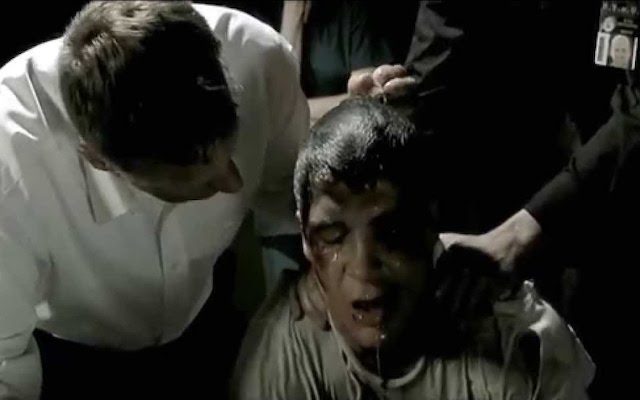
It’s not considered “hip” or “groovy” to be a churchgoing Christian nowadays in these United Heathen States of America, especially with that Muslim atheist Nazi socialist Kenyan fascist devil-worshipping gay usurper in the Oval Office, but there are still millions of devout Americans hungry for quality entertainment that reflects their religious values. That’s why there are movies like “The Freedom of Silence”: to serve as stark contrast to quality entertainment and help us recognize it if it ever arrives.
“The Freedom of Silence” is the result of years of painstaking technological development that now allows a movie to be created out of nothing more than gumption, paranoia, and your aunt’s Facebook posts. The movie doesn’t name any names, but the first line of dialogue is a news anchor ominously reporting that “the president … signed an executive order mandating Phase 2 of universal health care for all citizens,” so you can guess who they’re talking about, wink wink. Only one monster would be dastardly enough to implement something as horrible-sounding as “universal health care”!
And then some years pass and it is The Future. All the official descriptions of the film say 2030, but the movie itself never names a specific year, and no effort was made to give a futuristic spin to the costumes, props, or sets. From the looks of it, I’d have guessed the movie was set in 2006. Whatever year it is, America has long since outlawed Christianity, the Bible, and, apparently, professional acting. Some stalwart Christians meet secretly in underground church groups, but to avoid detection they must be cautious and only love their neighbors as themselves if nobody is watching.
If you’re nodding your head and thinking, “Yep, this is the direction the country is heading, and it is a real possibility that Christianity could be outlawed in the foreseeable future,” then congratulations, you’re the movie’s target audience! That is not a compliment.
Our hero, Zack Thompson (Tyler Messner), is a secret Christian who has been arrested for committing “a terrorist attack that affected millions.” We aren’t told what he did, but we get the distinct impression it was the noble and courageous type of terrorism (aka “freedom fighting”), not the bad kind (aka “killing people”). His very mean interrogator, Capt. Johansen (Jeffrey Staub), speaks dismissively of the U.S. Constitution — “Words on paper, written by dead men who died nearly three centuries ago, hardly relevant to today’s society” — and demands to know the names of Zack’s co-conspirators. But Zack will not budge. The only way anyone’s going to learn what happened is if there are flashbacks…
Flashback! Zack is a kid who sees a pony-tailed street preacher talking about Christianity. Zack knows this is against the law, but he’s intrigued. The preacher makes some excellent arguments against positions that nobody holds. “I like vanilla ice cream,” he says. “(Someone else) likes chocolate. Some men like to get drunk and beat their wives. And we’re told that morally, there’s no difference between any of this!” (Note: nobody says that.) “We’re told that we have to be TOLERANT of what other people do and say because there’s no such thing as right and wrong!” (Note: nobody says this either.)
Despite having misunderstood the difference between personal taste and ethics, and possibly the difference between opinions and facts, and probably the difference between his bottom and a hole in the ground, the preacher makes a strong impression on young Zack. He is hauled away by government operatives in black suits (really!) before he can read aloud from the Bible, but Zack sneaks off with it and clandestinely studies the scriptures in his bedroom, hiding his actions from his parents, who have swallowed the godless liberal pagan communist government’s anti-religion propaganda.
Now we have two timelines going, each more boring than the other (unless that is not possible). In 2030, we have Zack being tortured by Capt. Johnansen, pausing occasionally so they can have rudimentary arguments about the existence of God, which the movie thinks are devastatingly clever but which all sound like they came from one of those weird religious mini-comic books that Christian kids used to hand out. The other timeline covers the events leading up to Zack’s arrest, with him and his buddy Aaron (Chris Bylsma) carefully planning whatever it is they did. So in one timeline, we don’t know what Zack did, and in the other timeline, we don’t know what he’s about to do. The movie is a veritable orgy of not knowing things!
I wasn’t going to mention this next thing, but it really started to bother me, and the straw-man arguments, poor acting, and general idiocy made me increasingly less charitable. On one of the four or five days it took to make the film, the actor who plays Zack had some unsightly razor burn and acne on his neck and jawline. Yet for some reason, the director (who I assume was just a well-meaning youth pastor who had a camera shoved into his hands) kept shooting close-ups anyway, one after another. Maybe he didn’t think we would notice giant whiteheads occupying our television screens? Maybe he didn’t know the film would be available in high-definition? Maybe he felt it was sinful to use makeup? I don’t know, I don’t care. I just want to complain.
After a lot of talking, speechifying, point-making, diatribing, pontificating, lecturing, and choir-preaching-to, the movie finally reveals what Zack’s risky “terrorist attack” was. With Aaron’s technical assistance, Zack commandeers America’s airwaves and Internet connections and broadcasts live footage of himself sharing the good news of the Christian gospel. Furthermore, he ends his transmission by announcing that he has “sent a digital copy of the Bible to every email address in the world.” We should have guessed that unwanted emails would be the movie’s solution to its problems, considering its ideological resemblance to so many messages in my inbox whose subject lines start with “FW: FW: FW: FW: FW: FW:”
Thanks to this brave act of spamming, people start to reconsider the constitutional validity of laws banning Christianity. Why nobody voiced these concerns back when the laws were being passed, the movie does not explain, though presumably Obamacare is at the root of it. And don’t worry about Zack, either. When word gets out that the government is hurting him, there is a huge public outcry (oh, sure, NOW torturing people is bad), and he is released. On a personal note, I do believe in God, but sometimes I see movies bad enough to make me doubt.
— Film.com





